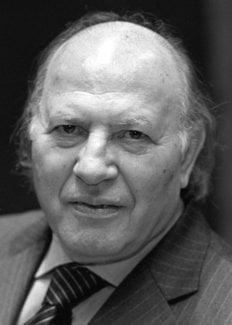Imre Kertész
Biographical
 Imre Kertész was born in Budapest on November 9, 1929. Of Jewish descent, in 1944 he was deported to Auschwitz and from there to Buchenwald, where he was liberated in 1945. On his return to Hungary he worked for a Budapest newspaper, Világosság, but was dismissed in 1951 when it adopted the Communist party line. After two years of military service he began supporting himself as an independent writer and translator of German-language authors such as Nietzsche, Hofmannsthal, Schnitzler, Freud, Roth, Wittgenstein, and Canetti, who have all had a significant influence on his own writing.
Imre Kertész was born in Budapest on November 9, 1929. Of Jewish descent, in 1944 he was deported to Auschwitz and from there to Buchenwald, where he was liberated in 1945. On his return to Hungary he worked for a Budapest newspaper, Világosság, but was dismissed in 1951 when it adopted the Communist party line. After two years of military service he began supporting himself as an independent writer and translator of German-language authors such as Nietzsche, Hofmannsthal, Schnitzler, Freud, Roth, Wittgenstein, and Canetti, who have all had a significant influence on his own writing.
Kertész’s first novel, Sorstalanság (Eng. Fateless, 1992; see WLT 67:4, p. 863), a work based on his experiences in Auschwitz and Buchenwald, was published in 1975. “When I am thinking about a new novel, I always think of Auschwitz,” he has said. This does not mean, however, that Sorstalanság is autobiographical in any simple sense: Kertész says himself that he has used the form of the autobiographical novel but that it is not autobiography. Sorstalanság was initially rejected for publication. When published eventually in 1975, it was received with compact silence. Kertész has written about this experience in A kudarc (1988; Fiasco). This novel is normally regarded as the second volume in a trilogy that begins with Sorstalanság and concludes with Kaddis a meg nem született gyermekért (1990; Eng. Kaddish for a Child Not Born, 1997; see WLT 74:1, p. 205), in a title that refers to the Jewish prayer for the dead. In Kaddis a meg nem született gyermekért, the protagonist of Sorstalanság and A kudarc, György Köves, reappears. His Kaddish is said for the child he refuses to beget in a world that permitted the existence of Auschwitz. Other prose works are A nyomkereső (1977; The pathfinder) and Az angol lobogó (1991; The English flag; see WLT 67:2, p. 412).
Gályanapló (Galley diary; see WLT 67:2, p. 412), a diary in fictional form that covers the years 1961-91, was published in 1992. Valaki más: A változás krónikája (1997; I – another: Chronicle of a metamorphosis), continues this inner monologue in the form of notes made during the years 1991-95. After the political upheavals of 1989, Kertész was able to make more public appearances. His lectures and essays have been collected in A holocaust mint kultúra (1993; The holocaust as culture), A gondolatnyi csend, amíg kivegzőoztag újratölt (1998; Moments of silence while the execution squad reloads), and A száműzött nyelv (2001; The exiled language).
Imre Kertész was awarded the Brandenburger Literaturpreis in 1995, the Leipziger Buchpreis zur Europäischen Verständigung in 1997, the Herder- Preis and the WELT-Literaturpreis in 2000, the Ehrenpreis der Robert-Bosch-Stiftung in 2001, and the Hans Sahl-Preis in 2002. His works have been translated into numerous languages, including German, Spanish, French, English, Czech, Russian, Swedish, and Hebrew.
Translated by Ivan Sanders
This autobiography/biography was written at the time of the award and later published in the book series Les Prix Nobel/ Nobel Lectures/The Nobel Prizes. The information is sometimes updated with an addendum submitted by the Laureate.
Imre Kertész died on 31 March 2016.
Nobel Prizes and laureates
See them all presented here.
